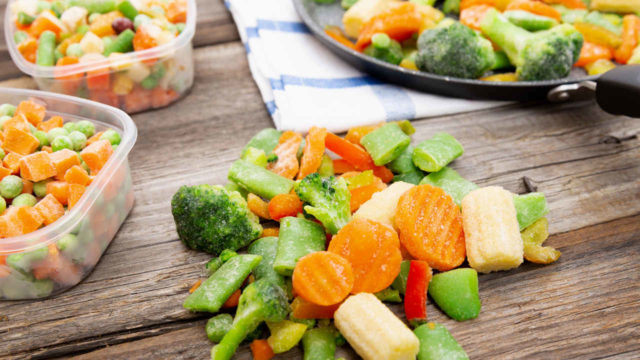 You may be surprised by how nutritious and delicious frozen and canned veggies can be.
You may be surprised by how nutritious and delicious frozen and canned veggies can be.
Finding it hard to fill your plate with fresh vegetables at this time of year? Don’t skimp on eating vegetables because you’re busy and don’t have time to prepare fresh vegetables or your favorite veggies just aren’t in season. Instead, use frozen or canned veggies – they’re healthier than you think and even more convenient than fresh.
Frozen vegetables are typically picked right at the time when they’re freshest – and then instantly frozen. The freezing process often happens hours after the vegetables are picked from the field. This retains nutrients and taste. Canned vegetables are also processed soon after being harvested.
In contrast, vegetables shipped in from far reaches of the globe during the winter often spend days or weeks in planes, trucks and warehouses. This means the fresh produce you pay top dollar for at the grocery store when out of season may not really be that fresh at all.
When using frozen or canned vegetables, just keep these tips in mind to improve taste and quality:
- Use frozen vegetables quickly. Because frozen foods go through slight thawing and refreezing cycles as the door opens, it’s best to use frozen vegetables as quickly as possible. Keep bags in the coldest part of the freezer and use them within a few months of purchase.
- Choose low-moisture vegetables. Some vegetables hold up better to the moisture of freezing. Corn, carrots, broccoli, cauliflower, peas, lima beans, artichokes and pearl onions are good choices. Mushrooms, snow peas, asparagus and bell peppers don’t fare as well when frozen.
- Select vegetables without added ingredients. The healthiest options are those that don’t include added salt, fat or heavy sauces. Choose low-sodium or no-salt-added canned vegetables. Opt for frozen vegetables without sauce or other added ingredients.
- Cook vegetables fully. Vegetables from the freezer or a can aren’t intended to be eaten out of the package. To ensure food safety and better taste, cook vegetables according to package instructions.
- Add vegetables to recipes. Frozen and canned vegetables can shine in recipes that include a variety of ingredients rather than just eating them on their own. Soups, stir-fry, pasta sauces and stews are perfect candidates (and are hearty winter meals).
Copyright 2019-2020 © Baldwin Publishing, Inc. All rights reserved.
Health eCooking® is a registered trademark of Baldwin Publishing, Inc. Cook eKitchen™ is a designated trademark of Baldwin Publishing, Inc. Any duplication or distribution of the information contained herein without the express approval of Baldwin Publishing, Inc. is strictly prohibited.
Date Last Reviewed: December 16, 2019
Editorial Review: Andrea Cohen, Editorial Director, Baldwin Publishing, Inc. Contact Editor
Medical Review: Nora Minno, RD, CDN
Learn more about Baldwin Publishing Inc. editorial policy, privacy policy, ADA compliance and sponsorship policy.
No information provided by Baldwin Publishing, Inc. in any article is a substitute for medical advice or treatment for any medical condition. Baldwin Publishing, Inc. strongly suggests that you use this information in consultation with your doctor or other health professional. Use or viewing of any Baldwin Publishing, Inc. article signifies your understanding and agreement to the disclaimer and acceptance of these terms of use.